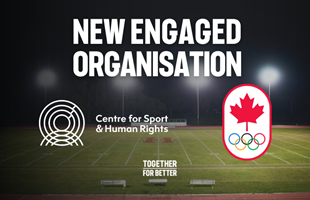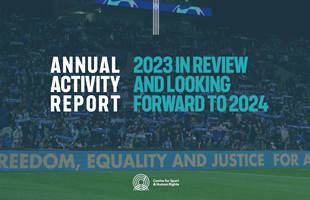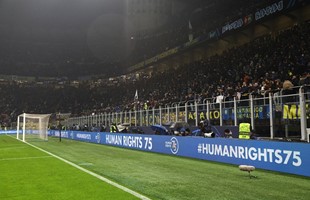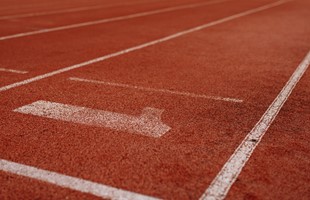Building Bridges Between Sports Bodies and NHRIs – Tangible Opportunities Highlighted in Rwanda
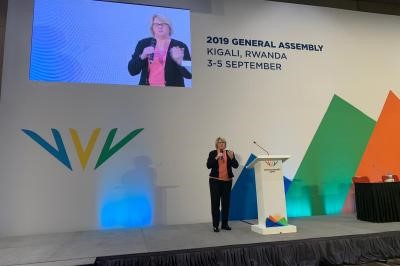
Kigali was a fitting location for Commonwealth Sport to engage its member associations on human rights last week. With the support of the Rwanda Commonwealth Games Association, the Rwandan National Commission for Human Rights and the Rwandan Ministry for Sports and Culture, the Commonwealth Games Federation General Assembly incorporated several important human rights events into the main programme. For the Centre for Sport and Human Rights, this presented an opportunity to build a bridge between experts from the human rights community and senior sports administrators who work at a national level. In a regional context, it also served as a chance to implement lessons from our recent workshop in Rabat, Morocco and explore themes common across Africa – a region with more National Human Rights Institutions (NHRIs) than any other.
Identifying opportunities for National Human Rights Institutions to engage with sport.
On 3 September 2019 the Centre partnered with the Northern Ireland Human Rights Commission and the Commonwealth Forum of National Human Rights Institutions to facilitate a day-long ‘Sport and Human Rights’ workshop for representatives of sixteen NHRIs from across the Commonwealth. The workshop explored the role of NHRIs as key enablers for sports bodies to work through human rights challenges they encounter, as well as being a partner that Commonwealth Games Associations (CGAs) can call upon as they look to implement the Commonwealth Sport Human Rights Strategy. We were also honoured to have the session opened by Evode Uwizeyimana Rwanda's Minister of State for Constitutional and Legal Affairs, who reflected on the importance of the Sporting Chance Principles in national contexts. We believe this is the start of a journey to support and facilitate NHRIs in their on-going engagement with the sports sector and in encouraging NHRIs around the world to collaborate with sports organisations.
"We believe this is the start of a journey to support and facilitate NHRIs in their on-going engagement with the sports sector and in encouraging NHRIs around the world to collaborate with sports organisations."
Advancing the collective impact of Commonwealth Games Associations
The following day, we convened a full-day workshop for CGAs, including interactive sessions mapping potential human rights impacts, and identifying opportunities to advance rights in national sport. We also had the opportunity to bring together CGAs with the NHRI representatives, an engagement that led several participants to suggest future collaborations with their respective counterparts. This again is the start of a journey, and the candid exchanges with CGA representatives was an important first step in realising Commonwealth Sport’s human rights vision. Each national context presents different risks and opportunities, and by encouraging sports bodies to work with NHRIs we hope to find scale in ensuring sporting organisations embed their responsibilities and use the special power of sport to promote human rights. This session also allowed us to delve deeper into the tailoring the guidance we provide to sports bodies. Our “Championing Human Rights in the Governance of Sports Bodies” tool is a great place to start, but not all sports bodies or federations are alike, and we appreciated the opportunity to consult with CGAs about how we can better hone this guidance to be directly applicable for national multi-sport governing bodies such as CGAs.
"We appreciated the opportunity to consult with CGAs about how we can better hone this guidance to be directly applicable for national multi-sport governing bodies such as CGAs."
Child Rights and Sports ConsultationWe also took the opportunity to convene a consultation on child rights in the context of sport. Participants included representatives of the NHRIs of Australia, Eswatini, Kenya, Malaysia, Nigeria, Northern Ireland, Rwanda, Samoa, South Africa, Uganda and Zambia and was co-facilitated by Linda Nxumalo, CEO of the Eswatini Human Rights Commission, and Dorothy Rozga, Head of Child Rights for the Centre. Participants exchanged views and experiences related to child rights violations in the context of sport. Participants observed that there was little awareness of this issue and that for a range of reasons such cases are rarely brought to the attention of NHRIs. Potential roles for NHRIs relate to research, promotion of data collection and advocating for systemic changes. Several NHRIs have developed tools and resource materials on child protection and safeguarding in sports and offered to share them. The meeting concluded with a commitment by the Centre to provide resource materials and continue a dialogue with NHRIs on the issue.
Young Ambassadors for Human RightsWe also enjoyed the opportunity to convene a lunch consultation with representatives of the Young Ambassadors for Human Rights in Sport of the Rwandan Commonwealth Games Association and Young Ambassadors from the Northern Ireland Commonwealth Games Council. The consultation focused on obtaining their views on how young persons can exercise their right to have a voice in sports. One member each from the Rwandan and Northern Ireland Ambassadors will be selected to share the views of their groups during the upcoming Sporting Chance Forum.
A pilot project in RwandaI also had the honour of meeting with Espérance Nyirasafari, Rwanda’s Minister for Sports and Culture. The Minister shared the Government’s vision of all Rwandans benefiting from sports. Towards this end, her Ministry is giving priority to the development of sports at the local level, reaching children through schools, and addressing barriers to accessing sports. Government is currently in the process of developing a strategy for gender mainstreaming in sports. The meeting concluded with the Centre committing to collaborate with the Ministry, the Commonwealth Games Association and the National Commission for Human Rights on actions to ensure that the rights of children are protected in sports and that more girls, women and persons with disabilities are protected and have access to sport. This will be a fantastic opportunity to reach grassroots sport, and pilot the types of engagement we at the Centre can foster between the world of sport and human rights experts.
